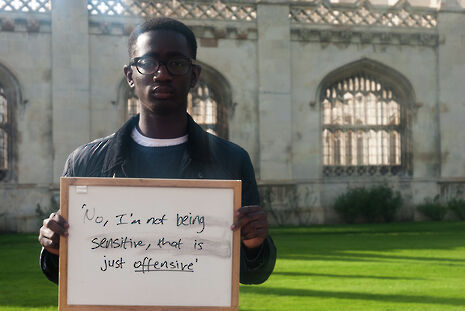I, too, am Cambridge and the price of ignorance
Sogo Akintaro praises the ‘I, too, am Cambridge’ campaign, arguing that unless we address these prejudices, they are destined to inform our behaviour

“Real knowledge is to know the extent of one's ignorance” – Confucius
In Cambridge, a prestigious educational centre surrounded by academics and a rich intellectual history, you would have thought more people would have ‘real knowledge’. It is clear from my experience, and those shared by others on the ‘I, too, am Cambridge’ campaign, that this is not the case. The campaign highlights the racial ignorance that still exists in society, not only limited to Cambridge. Ignorance likens a disease but the issue is that most people don’t know they have it. This is particularly why campaigns like this are crucial to raise awareness and challenge people’s presumptions. People need to become aware that ignorance has a price.
When an individual makes a comment laced with ignorance, and are not aware of the inherent ignorance or the impact their comment may have on a third party, they will continue to make such comments. The issue with these comments are that they are reinforcing prejudice which is socially damaging. Individuals might not realise the full cost of their thoughtless remarks but they are in fact damaging.
During my time here, I have been subject to comments like ‘[in a dark lit room] haha, we can’t find Sogo!’ These comments are seen as banter with no further implication; despite me being able to take a joke, others in the same position may not be able to. Where I draw the line is when ‘jokes’ are made about a race which reinforces negative stereotypes and prejudice. When discussing cyclists in Cambridge ignoring red lights, for example, I pointed out it is technically illegal under the Highway Code meaning they should be punished for it. I jokingly suggested imprisonment as a punishment, however I was shocked to receive the response: ‘that’s funny coming from a black man’. These ‘jokes’ aren’t funny, they are simply offensive. How am I supposed to react to comments like that?
The fact that the joke was made is down to the stereotype people have of incarcerated black men and the false association of most black men to that image. It also builds on the stereotype of us being an aggressive bunch of people, which is simply untrue. Jokes like this wouldn’t be made if we didn’t have these stereotypes - and they actually perpetuate the cycle. These stereotypes are socially destructive; the Trayvon Martin case perfectly illustrates this issue.
This entire issue of ignorance is not only isolated to black people but also to people of ethnic minority backgrounds. In an institution like Cambridge, ignorance simply means inconvenience and frustration for the person on the receiving end, however the stakes are much higher in the wider society. It is for this reason that I praise Yasmin Lawal and Millie Ngaage for their role in the ‘I, too, am Cambridge’ movement because it brings up these important issues, raises awareness and sparks discussions. Ignorance is not going to disappear unless we actively dispel it. We must ensure people realise the full cost of their actions and realise that casual racism is far from ‘banter’.
 News / Police to stop searching for stolen Fitzwilliam jade17 April 2024
News / Police to stop searching for stolen Fitzwilliam jade17 April 2024 News / Copycat don caught again19 April 2024
News / Copycat don caught again19 April 2024 Interviews / ‘It fills you with a sense of awe’: the year abroad experience17 April 2024
Interviews / ‘It fills you with a sense of awe’: the year abroad experience17 April 2024 News / Night Climbers call for Cambridge to cut ties with Israel in new stunt15 April 2024
News / Night Climbers call for Cambridge to cut ties with Israel in new stunt15 April 2024 News / Acting vice-chancellor paid £234,000 for nine month stint19 April 2024
News / Acting vice-chancellor paid £234,000 for nine month stint19 April 2024




